Table of Contents
Introduction
On top of being a leadership consultant, I’m also a gamer. So, I’ve been following the turbulent happenings at the once-renowned game developer and publisher Ubisoft.
Usually, I don’t comment on gaming-related issues on this blog, but there are some important lessons we, as leaders, can learn from the mistakes Ubisoft management has been making.
In this post, we’ll examine those mistakes and then discuss what we, as leaders, can do to avoid making the same mistakes in our own leadership practices.
Now, before we get into their mistakes, what is Ubisoft for those of you from non-gamer backgrounds?
What is Ubisoft?
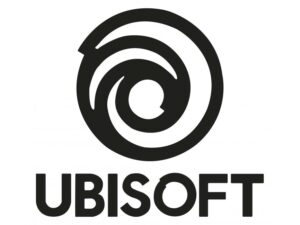
Ubisoft is a publicly traded company that makes video games. It is based in Paris, France, and has offices worldwide. The Guillemot brothers founded Ubisoft in the 1980s, and the company rose to prominence in the late 2000s.
Ubisoft is well known for franchises like Assassin’s Creed, Far Cry, and the Tom Clancy games. They’re also responsible for Rayman, Watchdogs, Beyond Good and Evil, and other famous franchises.
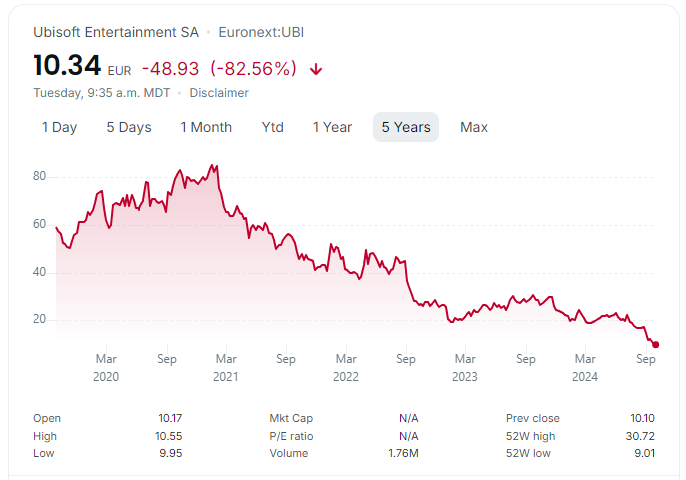
However, they’ve been in decline since the mid-2010s. Over the last five years, the company’s stock has lost over 80% of its value.
So, what went wrong, and what can we learn from them?
Leadership Mistake #1 – Not listening to feedback or criticism
The first of Ubisoft’s leadership mistakes became apparent as the company peaked in the mid-2010s. It began to prioritize money-making strategies that didn’t always focus on creating a positive gameplay experience for consumers.
Unsurprisingly, this led to a worsening consumer experience across their popular titles. As Ubisoft followed a business model that didn’t cater to consumer desires, consumers took to social media to voice their concerns.
Now, I’ll be the first to admit that gamers, like most people, aren’t always the best communicators. Especially when they feel their loyalty to a company or video game franchise has been betrayed.
So, did many gamers voice their opinions in non-constructive or even toxic ways? Absolutely. Gamers are passionate about their video games, and that passion doesn’t always translate to calm, well-thought-out criticism.
But, amid the bad communication, many valuable criticisms were being levelled at Ubisoft.
Ubisoft games were notoriously buggy. Their designs were becoming more repetitive and formulaic. The company prioritized money-making strategies over story-telling and fun gameplay. The list goes on and on.
What was the response by Ubisoft’s leadership?
According to reports by YouTuber LegendaryDrops, Ubisoft’s leadership told staff to ignore and write off all criticism as “toxic gamer rage.”
This suggests that the leadership at Ubisoft is ignoring criticism and feedback from their consumers.
And, when you’re in the business of providing a compelling gaming experience to your consumers, not listening to their feedback isn’t a winning strategy.
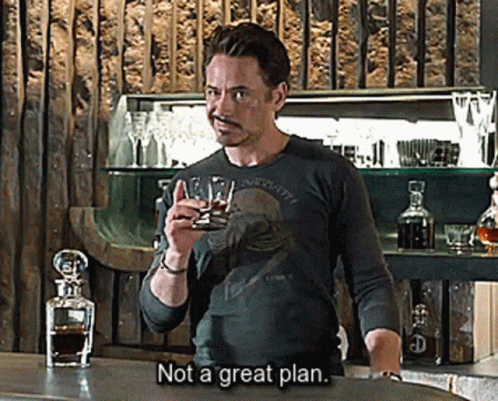
The lesson we as leaders need to learn from Ubisoft is pretty obvious.
Lesson #1 – Listen to feedback and criticism
I think most people understand that Ubisoft’s choice not to listen to criticism was a mistake.
Criticism and feedback are a source of valuable growth opportunities. Criticism helps us seek learning opportunities by identifying areas for improvement. When we listen to criticism, we’re more likely to self-reflect and examine our actions and the goals and motivations driving them.
What about “toxic criticism?” Should we listen to that?
Ubisoft’s management was wrong to label all criticism as toxic. That much is clear. By doing so, they closed themselves off to genuine opportunities to learn from what was and wasn’t working.
But that doesn’t mean all the criticism they received was valuable. I have no doubt that a large portion of it wasn’t constructive and was probably even “toxic.”
But, by labelling everything as toxic, they threw the critical baby out with the critical bathwater.
I’m sorry to say that during your career, you will receive criticism that isn’t constructive. You will also likely receive toxic criticism.
I wish that weren’t the case, but many people in management positions aren’t practicing leadership the way I wish they would.
Should you ignore all of that criticism? Yes and no.
Alcoholics Anonymous uses the expression, “Take what you like and leave the rest.”
It’s about selectively adopting the principles and practices that resonate with you at that moment. It recognizes that people will be more successful if they approach self-improvement one small step at a time.
Criticism in all forms allows us to build resilience. It makes us more adaptable and helps us better recognize and work with our emotions (and the emotions of others). Criticism presents us with setbacks and challenges us to overcome them.
Receiving criticism, even constructive criticism, is uncomfortable; it challenges our self-image and raises self-doubt. But as leaders, we need to take criticism and learn from it, no matter how it lands.
When we receive criticism, we first and foremost need to listen—and I mean actively listen. Listen to the criticism and ensure you understand what the other person is saying before responding.
Even with non-constructive criticism, try to sift through and tease out the critical issue.
And don’t take the Ubisoft approach of sticking your fingers in your ears and singing, “La la la, I can’t hear you.”
Once you’ve heard the criticism and it’s your turn to respond, start by asking questions to improve your understanding of it. Try to ask open-ended questions that encourage more discussion. Open-ended questions are questions that cannot be answered with one-word answers.
Questions like:
- It sounds like you think [X] was the wrong decision. What approach do you think we should have taken?
- I’m hearing that you didn’t like [X]. How do you think we could improve on it in the future?
Ubisoft would be in a much better situation if its management responded to fan criticism by encouraging discussions.

Imagine Ubisoft CEO, Yves Guillemot sitting down with a popular gaming YouTuber and saying, “It sounds like consumers think our monetization strategy in our games was hurting the gameplay experience. What approach do you think we should have taken?”
This highlights another essential strategy for giving and receiving criticism: face-to-face communication. I know this is harder to do in our increasingly virtual world, but hey, Zoom, Teams, and Meet all exist.
Face-to-face or screen-to-screen communication adds levels of nuance that cannot be communicated in an email. Our tone of voice and body language are important parts of communication, whether we consciously recognize them.
The most important aspect of taking criticism is the learning experience it provides—not only from the specific criticism but also from the practice of receiving criticism.
The more you learn to receive criticism, the better you’ll be able to respond to and learn from it.
Had Ubisoft’s management been more practiced at receiving criticism, they might have been able to filter through the negative or toxic criticism and pull out the genuine criticism that could have made them a stronger, more consumer-focused company.
Another criticism Ubisoft seems to be ignoring is how it has been treating its employees, which leads us to its second mistake.
Mistake #2 – Not taking care of their people
In addition to the negative consumer sentiment, Ubisoft faces considerable internal strife between its employees and management.
In 2020, Ubisoft employees raised alarms about a highly toxic workplace culture that included severe allegations of workplace misconduct and sexual harassment, often involving upper management.
Employees made it sound like management tried to ignore the problem, and when that failed, they were slow to respond with meaningful changes.
Employees feel this slow or limited response extends to management reactions to consumer criticisms I mentioned earlier.
CEO Yves Guillemot has also commented that Ubisoft employees must take responsibility for the company’s failing financial position. This has made employees feel like management is throwing them under the bus. Like consumers, employees tend to think Ubisoft’s woes are based on poor leadership and strategic direction.
Moreover, as Ubisoft’s financial position has eroded, management has resorted to cost-cutting measures like job cuts and restructuring. This increases the divide between management and employees and is also leading to a sentiment of fear and confusion for Ubisoft employees as their job security disappears.
Again, the lesson seems pretty obvious.
Lesson #2 – Take care of your effing people
It’s obvious that allowing workplace misconduct or sexual harassment is completely unfit for a leader. If you’ve got these problems in your company, you must deal with them immediately.
You’ve probably heard the expression an ounce of prevention is worth a pound of cure.
Well, that works with workplace misconduct, too.
Leaders need to establish their organizations’ culture and clearly define their expectations. A workplace code of conduct backed by consistent enforcement is an excellent place to start.
The code of conduct should then be backed up by policies and procedures that are clear, properly communicated, and understood at every level in the company.
Appropriate training and support from leadership are needed to ensure the new culture has the necessary impact. This includes a framework that provides a clearly understood process for handling misconduct allegations. This can include anonymous reporting, thorough and transparent investigations, fair and unbiased evaluations of the allegations and appropriate and proportionate sanctions.
None of these appear to be happening at Ubisoft.
Moreover, they appear to have little to no respect for work-life balance, with numerous employees expressing “crunch” as a serious problem at the company. Crunch, where employees are expected to work well beyond normal bounds to meet release windows, is something the video game industry is notorious for, although it occurs in many other industries, too.

However, it isn’t a necessary evil in video game production. Companies like Supergiant Games and Insomniac Games reportedly have much better work-life balance for their employees and actively try to avoid the crunch. Instead of mandatory overtime, Supergiant Games has mandatory vacation days.
Even Nintendo, a long-time triple-A presence in the industry, is known for minimizing crunch and encouraging work-life balance for their developers.
Nintendo aside, crunch isn’t a necessary part of high-level game development either. Supergiant’s last release is a very popular, critically acclaimed game called Hades. It’s estimated that Hades netted Supergiant over $200 million. In contrast, if the estimates are accurate, development costs sit around a tenth of that—a respectable return on investment.
Now, look a Ubisoft. Their most recent notable release is a Star Wars game called Star Wars Outlaws. While project costs are a closely kept secret, game development costs in the “triple A” segment have skyrocketed. Industry analysts have suggested that the game likely cost hundreds of millions of dollars to develop. At the same time, Yves Guillemot boasted in an earnings call that the Star Wars Outlaws marketing campaign was “…the biggest marketing campaign ever so far for a Ubisoft game.” So, while we don’t know the exact development cost for Star Wars Outlaws, it’s safe to assume it took a massive investment from Ubisoft.
Ubisoft admits that sales have been underwhelming and that they’re disappointed with the game’s financial performance. I’m not a Ubisoft executive, but that’s usually corporate speak for, “The product we launched isn’t going to make us a bunch of money.”
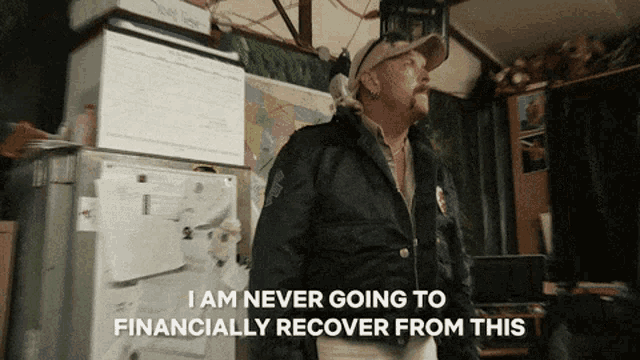
I won’t go so far as to say that Ubisoft’s less-than-stellar treatment of their employees caused the game to fail; there are plenty of profitable games made by companies that treat their employees like crap. However, comparing Ubisoft to Supergiant demonstrates that mistreating your employees isn’t a winning strategy, and the opposite can be very profitable.
It’s wrong to treat your employees poorly. Duh.
Good relationships between leadership and employees require trust, respect, and empathy. It sounds like Ubisoft’s leadership team has not prioritized those values to the detriment of their company.
I don’t know what direction Ubisoft’s leadership will take next, but I would encourage them to rethink their organization’s culture completely.
Ubisoft leadership must make concerted efforts to improve work-life balance and build employee trust and respect. They have to overhaul their planning process and incorporate more realistic targets and manageable deadlines.
They’ll also want to improve communication between employees and leadership, focusing on transparent communication of expectations and results. Regular feedback loops supported by ongoing check-ins can help prevent problems from spiralling into emergencies that require a crunch to sort out.
Finally, in this new culture, Ubisoft’s leadership must take full responsibility for the company’s issues and demonstrate to shareholders, employees and customers that they have developed an improvement plan with measurable timelines.
I honestly cannot tell you whether this will happen. But whether Ubisoft learns from its mistakes or not, you can heed these warnings in your own leadership practice.
With that in mind, let’s move on to Ubisoft’s next big mistake: miserable communication.
Mistake #3 – Communication that isn’t honest or transparent
Earlier in 2024, Ubisoft CEO Yves Guillemot was quoted as calling the upcoming game Skull and Bones a quadruple-A game. His comment riffed on the triple-A moniker often applied to games made by large corporate game developers.
However, it betrays a more significant concern about Ubisoft’s leadership. First, this comment was made during an earnings call when an investor questioned the high price of Skull and Bones. In his attempts to address the criticism, the Ubisoft CEO engaged in hyperbole.
Now, this wouldn’t be a mortal sin were it not for the fact that, upon release, most people were disappointed with the game. The quadruple-A tagline immediately became a tool of ridicule as consumers and entertainers mocked the game.
This mockery has now extended to Ubisoft’s other releases like Star Wars Outlaws. Quadruple-A game has quickly become synonymous with “a mediocre game made by Ubisoft.”
Likewise, their treatment of the controversy over Assassin’s Creed Shadows lacks transparency and cultural sensitivity. Ubisoft is being criticized for hiring activist consultants to argue on their side.
I won’t comment on the controversy—enough people have already done that. However, as a company not known for honest and transparent communications, its actions here have not done it any favours.
I previously touched on the reports of Ubisoft’s internal communications with employees and what seems to be a lack of responsibility on the part of leadership regarding these communication failures, whether relating to the company’s infamous workplace misconduct issues or financial woes. But that’s one more issue in a long line of communication mistakes.
Lesson #3 – Good communication is one of the pillars of leadership
There’s no other way to say it. To be a good leader, you have to be a good communicator.
That’s not to say that all leaders are exceptional communicators, but they should be proficient with the basics of communication.
That starts with being clear and concise. Every piece of communication has a purpose and a message to convey, and the focus should be on the message.
To paraphrase my 8th-grade English teacher, communications should be like a miniskirt: just long enough to cover everything important but still short enough to keep it interesting.
Communications from video game companies, in general, tend to be lacking in this area, and while Ubisoft is among them, the problem isn’t exclusive to them. Marketing hype and hyperbole abound.
I have always liked the phrase “under-promise and overachieve.”
Most video game companies do the opposite.
Ubisoft does this regularly, building hype for games that don’t end up getting released or are released over a decade later and are shadows of the original promise, like Skull and Bones.
Copywriters will tell you that you should always meet your audience where they’re at. Try to enter the conversation they’re already having in their heads. In a strict communication sense, that means having a solid understanding of your audience and crafting your message to meet their needs and expectations. It also means treating your audience respectfully, as though they are important to you.
Writing off a large segment of your customer base as toxic for criticizing your work or blaming your employees for your company’s financial failures would be two examples of how not to respect your audience.
A good communicator is also adaptable. They listen to feedback from their audience and adjust their messaging accordingly. They’re also prepared to update the message in response to new information or shifting priorities.
To do this properly, good communicators must be transparent and honest with their audience. Authenticity is a powerful communication tool, but it requires two challenging behaviours.
First, to be an authentic communicator, you must be in touch with and in control of your emotions.
Authentic communicators speak from their hearts.
Humans are social animals. Tens of thousands of years of evolution have given us an innate sense of when people are being phony. People who hide or obfuscate their true feelings or intentions feel phony to us, even if only on a subconscious level. They won’t feel genuine.
Speaking from the heart means sharing your true feelings in your communications. If you have reservations about a specific strategy, be honest about them. If you think a product didn’t meet your or your customers’ expectations, tell them that and apologize.
Our emotions drive our behaviour. As Jonathan Haidt reminds us, we rationalize everything after the fact, but that doesn’t change how we make decisions. Connecting with your audience through genuine emotions builds a rapport that other means cannot achieve.
The opposite approach is currently employed at Ubisoft.
It’s a reactive or ego-based communication style.
Authentic communication requires supplanting the reactive and protective nature of our egos. Authenticity requires a vulnerability that our egos try to hide.
Referring to your game by a never-before-used moniker (like quadruple-A) is reactive, ego-based communication. As I stated previously, it’s not authentic; it was immediately obvious to everyone who heard it, which led to the mockery.
However, authentically addressing the investor’s criticism would have required a level of vulnerability that Ubisoft’s leadership doesn’t appear prepared for.
Hopefully, you’ll be able to learn from Ubisoft’s mistakes in your own leadership practice, but I’m not confident Ubisoft’s leadership will.
Mistake #4 – Not having a cohesive vision
The primary purpose of leadership is crafting a vision and inspiring your people to follow it. You are not practicing leadership if you don’t have a vision to inspire others to pursue. The more I investigate Ubisoft’s current situation, the more I find its leadership lacks a cohesive vision.
Ubisoft is a company that makes games, but its reason for doing so, its vision, seems opaque at best.
Yes, they’re trying to make money, as all companies do, but that’s a byproduct of pursuing the vision. As leadership guru Simon Sinek puts it, the vision is the ‘why.’ And Ubisoft seems to lack the why behind the games they’re making.
This has led them to chase various fads without clear direction or focus. They beat the open-world horse to death and continued to beat it long after. They quadrupled down (pun very much intended) on live-service games and blockchain oddities like NFTs, even as consumers questioned their motives. Even their enthusiastic venture into Diversity, Equity and Inclusion (DEI) seems more like chasing a fad than a genuine concern for any of the values DEI supports.
But what happened? How did Ubisoft go from a gaming powerhouse to a fad-chasing, consumer-ignoring, greed-focused, mediocrity factory?
I have a theory, and it involves Napoleon III, sort of.
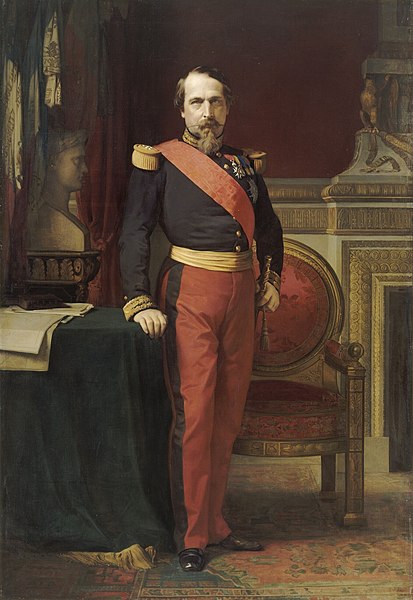
In 2015, around the time of Ubisoft’s initial decline, another French company called Vivendi tried a hostile takeover of Ubisoft. Vivendi, a large multi-faceted company founded by Napoleon III as a water supply company, turned its focus to media in the 1990s. By the 2010s, they were in the midst of establishing a gaming division. They acquired mobile game developer Gameloft and then set their sights on Ubisoft.
By 2017, Vivendi had acquired a 27% stake in Ubisoft. Under French law, had Vivendi reached the 30% threshold, the would have been required to make a formal takeover offer.
The Guillemot brothers understandably resisted Vivendi’s efforts to take over their company, fighting tooth and nail. In 2018, they convinced Vivendi to take a hike, and Vivendi proceeded to sell its entire stake in the company.
At the time, Ubisoft management celebrated this as a victory for the company, but I don’t think they’ve been the same since. Almost losing your family’s company to a hostile takeover would, understandably, cause some issues.
At this point, Ubisoft went from being an innovative and proactive company to a reactive and defensive company. They started playing it safe and focusing solely on making money.
This led to their much-maligned practice of recycling their franchises and chasing fads like live-service games and monetization in full-price single-player games.
They survived the crisis, but it changed them. Ubisoft post-Vivendi is not the same as Ubisoft at its peak. The company was shaken to its core, and its vision never recovered.
Lesson #4 – You cannot have leadership without vision
The bravest are surely those who have the clearest vision of what is before them, glory and danger alike, and yet notwithstanding, go out to meet it. – Thucydides
Let them alone; they are blind guides of the blind. And if a blind man guides a blind man, both will fall into a pit. – Matthew 15:14
When I say that Ubisoft’s current malaise is due to a lack of vision from leadership, I hope I’m stressing just how dire that situation is.
Without a cohesive vision, a team of managers leads Ubisoft, and there is no leadership. They can stick to a holding pattern (primarily describing the post-Vivendi Ubisoft) but will not break out of it without leadership.
And in order to have leadership, they need a cohesive vision—a ‘why’—to guide every decision in the company.
In your own leadership practice, you need to craft this vision for your company, department, or team and set it as your north star. It should inform and guide every decision you make. Without a vision, you and your people will fall into the same pit that Ubisoft finds itself in.
So, how do they get out of it?
Yves Guillemot and Ubisoft’s board of directors must set a clear and cohesive vision for the company soon. That vision must then inform every decision they make going forward.
What vision would I recommend to Ubisoft? On the very remote chance that Yves stumbles on this, let’s do it in French so he understands it.
Ubisoft est le meilleur. (Ubisoft is the best).
Ubisoft makes the best games; Ubisoft games have the best gameplay, story, characters, etc. Ubisoft treats its consumers the best, with transparent and authentic communication. Ubisoft treats its employees the best, setting the industry standard for work-life balance and employee satisfaction.
When faced with exploitative live-service models and fads like NFTs. Ubisoft would have a North Star to guide their decisions. Do these fads make us the best? If the answer is ‘no,’ the fad is quickly abandoned.
All of the criticism they receive can be filtered through the same lens. Would heeding this criticism make us the best? Yes, then follow it. No, then ignore it.
But, I’ll freely admit, it’s much easier to write a couple of paragraphs about what Ubisoft should do than it will be actually to do it. We’re talking about completely re-aligning every aspect of the company. To heal from the trauma of a hostile takeover and move forward. I loved Ubisoft at its peak and would love to see it return to those heights. They need a cohesive vision to get there, but I don’t know if the company’s leadership has it in them to make the journey.
The lesson for you on your leadership journey is just how important vision is to leadership. Without vision, you cannot practice leadership.
You can adjust or reevaluate a vision, but you cannot abandon it without abandoning your leadership practice.
Hold on to your vision and encourage those around you to do the same. Be relentless in your pursuit of the vision. Respect it, and it will guide you to success.
If you’re interested in applying this advice to your leadership practice, consider booking a free one-hour chat with me.

